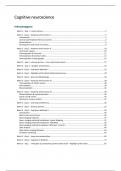Class notes
Cognitive Neuroscience lecture notes (AB_1056)
- Course
- Institution
- Book
College slides and information. Sometimes added information with Chatgpt when I didn't understand something. Might miss some information in the last lecture, because I made mind maps and didn't add it in my document - Mindmaps also available
[Show more]




